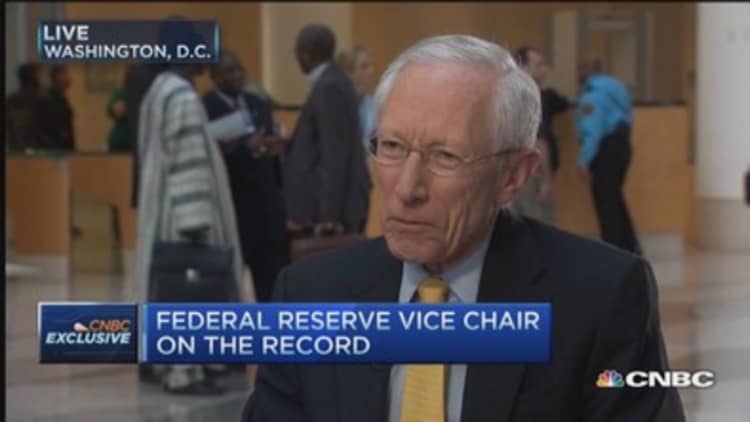
Although the first quarter of the year was "poor," an economic rebound is already underway in the U.S., according to Federal Reserve Vice Chair Stanley Fischer.
The central banker acknowledged in a Thursday interview that most expect the Fed to raise interest rates sometime this year, but he attempted to assure markets that such a move would be incremental and steady.
Following his comments to CNBC, the bond market turned negative on fears that his expectation of an economic rebound and mild wage increases—for which he said "there are more signs every day"—could mean an interest rate hike sooner rather than later. (Tweet This)
"We expect that the markets look ahead somewhat, so I think—I hope—that they are taking into account that the Fed, at some point, is likely to raise the interest rate," he said, adding that markets "can't depend on the current situation continuing forever—or even probably—beyond the end of this year."
Still, Fischer emphasized that a tightening would be slight.
"We have to ask what will go wrong," he said. "I say that if we get this in proportion, we're going to be changing monetary policy from the most extremely expansionary we've been able to do in all of history, to an extremely expansionary monetary policy."
Fischer added that the expected increase of a quarter of a percent would be the lowest rates had ever been if not for the recent move to zero.
Read MoreThe Federal Reserve: CNBC Explains
"My impression is the Fed is saying one thing and the market is hearing another. The Fed is saying it would have to be a really, really bad economic outlook for us to not go forward with the liftoff rate hike," said Ian Lyngen, senior Treasury strategist at CRT.
"I think the Fed would be indifferent about that happening the third or fourth quarter this year or the first quarter next year, and that's what Fischer is telling us," he added. "The market is interpreting that as hinting at the 'sooner rather than later' timing that has been bantered about by recent Fed speakers."
Reflecting on a U.S. 10-year yield below 2 percent, Fischer said that shows that markets are waiting to see what the Fed's next move will be. Once the bond market is convinced of an upcoming rate hike "we'll probably see a reaction," he said.
Read MoreI worry about Fed-induced asset bubbles: Paulson
While the strong dollar may indicate that international foreign exchange markets are already convinced of an upcoming hike, Fischer emphasized that "we don't know, so we look at what they think."
Although many have pointed to that strong dollar for a weakening of the U.S. economy, Fischer said that the Fed did not lay the blame solely on the greenback.
"Yeah we take it into account, but we don't sit around saying 'the economy is weak because of that,'" he said. "The dollar is one of many factors effecting the way the economy is behaving."
Read MoreRon Paul: Watch out. Dollar's in a 'huge bubble'
Looking internationally, Fischer said the European Central Bank's quantitative easing policy is "far more successful at this point than the general view had been before they started."
"They've got some wind in their sails," he said of Europeans' economic fortunes.
—CNBC's Patti Domm contributed to this report.


